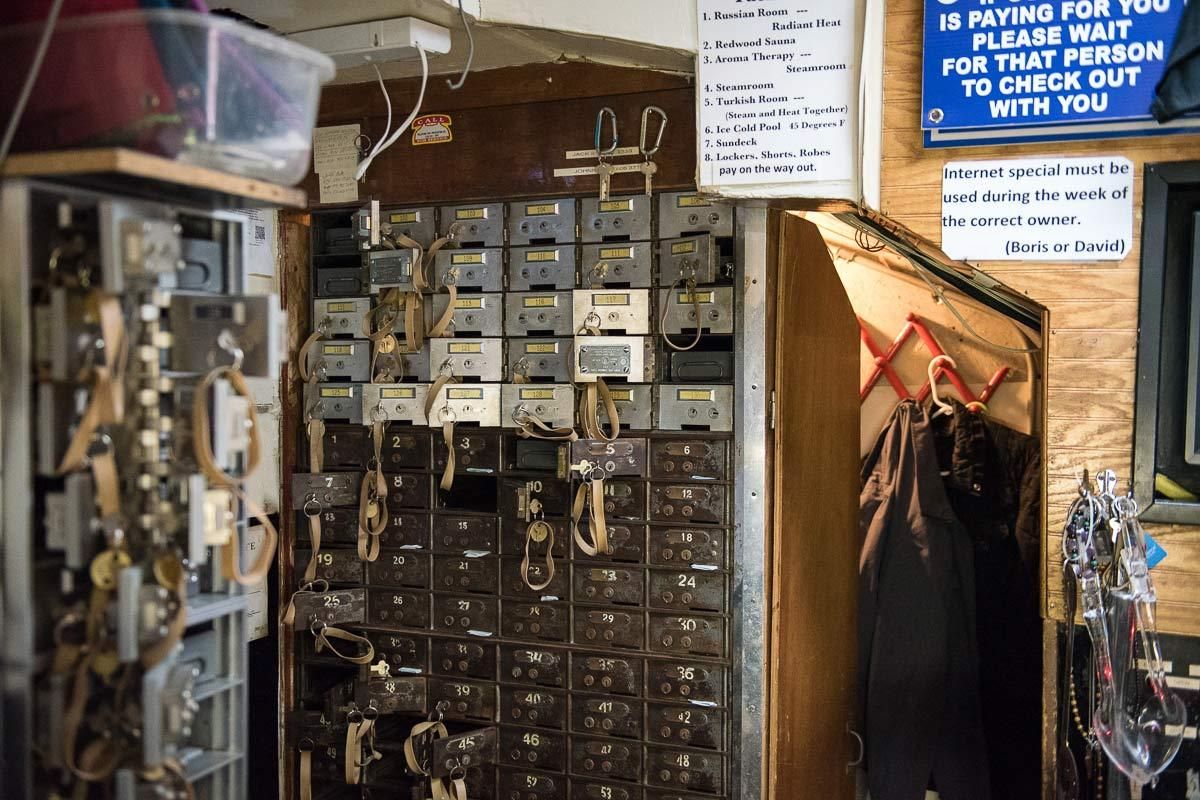Russian & Turkish Baths
Highlights
Step into the historic Russian and Turkish Baths in the East Village, a cozy, no-frills escape since 1892, where you can sweat, soak, and snack on hearty comfort food.
Step into the historic Russian and Turkish Baths in the East Village, a cozy, no-frills escape since 1892, where you can sweat, soak, and snack on hearty comfort food.
"The bath house is an iconic neighborhood establishment that opened in 1892 and is currently run by Boris and David. It’s not your typical Manhattan spa and there is nothing fancy about it but you’ll leave feeling relaxed and refreshed. Along with the baths they offer different treatments and massages. In the summer they open up the sun deck on the roof so people can layout. A pro-tip: BYOS — Bring Your Own Sandals." - Champions
"The Russian & Turkish Baths are, in a way, a microcosm of what it’s like to live in New York — it’s on you to find calm within the chaos of so many bodies darting from room to room during primetime. As at several of the New York spots like it, restorative snacks can be found at its bathhouse cafe. This weekend, friends and I stopped by to share bowls of pierogi and pelmeni ($8-$10 per order, served with a side of sour cream and stuffed with potato or meat) in between stints in the sauna and sweating out our sins." - Eater Staff
"Russian and Turkish Baths, East Village by Champions. The bath house is an iconic neighborhood establishment that opened in 1892 and is currently run by Boris and David. It’s not your typical Manhattan spa and there is nothing fancy about it but you’ll leave feeling relaxed and refreshed. Along with the baths they offer different treatments and massages. In the summer they open up the sun deck on the roof so people can layout. A pro-tip: BYOS — Bring Your Own Sandals."

"It is a truth universally acknowledged that a human being who has just been therapeutically beaten by oak branches in an extremely hot room will be in want of a good bowl of borscht. Where better to find both leafy skincare solutions and delicious beet soup than at New York City’s famous Russian and Turkish Baths? Also called the Tenth Street Baths because of its historic location on Manhattan’s (you guessed it) East 10th Street, the baths are part of a long tradition that has included crowded tenements and seedy mobsters, a feud between the owners, and a delightful selection of blini. Like most things about the baths, their founding is shrouded in mystery, half-history and half-myth. It’s thought that it first opened its doors in 1892, in a building that was a former tenement. The banya, as it’s called in Russian, was part of a wave of bathhouse openings across New York, promoted by city authorities to help sanitize the predominantly immigrant residents of the above-mentioned tenements, which lacked running water. The golden days of the bathhouses saw mafiosi and movie stars alike hit the steam rooms to wine and dine, wheel and deal. Vodka was served in the lobby, and rumor has it that mobsters were required to check their guns at the door, and preferred hearing-impaired masseurs—less risk that they would talk. In the 1970s and ’80s, the city’s bathhouses became palaces of gay sensuality and desire, as raucous disco culture spilled into their steamy insides. Most bathhouses in the city were shut down during the ’80s AIDS crisis. The Russian and Turkish Baths survived, however, and continues to survive, albeit with a mixed clientele: Today, hipsters with Groupons mix with Russian and Jewish old timers, whose paunches are as distinguished as their places of historical honor in bathhouse culture. The bathhouse’s cafe reflects this diverse customer base with mixed fare. A selection of Russian and Jewish comfort food—from fragrant herring with chopped onions and tomatoes to plump, meaty Siberian pelmeni beef dumplings—mixes with a decidedly more frou-frou juice bar. Those horrified at the prospect of $9 juice shouldn’t fear, however. Lovers of tradition, depleted after a roast in the sauna, can still opt for a hearty bowl of pork stew, a bagel with lox, or Turkish-style dolma (grape leaves stuffed with rice). While vodka is no longer on the menu, modern-day wise guys can still enjoy a beer. Know Before You Go Thanks to a decades-old feud between the owners, the origins of which have been lost in the aromatherapeutic steam of history, the baths are now run biweekly by owners Boris and David, who share the facilities but do not share the profits. Before you go, check the website to see which owner's week it is. Each owner sells separate passes, and you can use only the right person's pass on their week—no fence sitting here. You should also check to see which genders will be admitted: Some time slots are all-women or all-men." - Reina Gattuso, sethmeisterg
Emily Grandstaff
Thomas Richards
Michael
Benjamin Adams
Theresa D'lor
Anton Trefilov
A Johnson
Rebekah McCall
Emily Grandstaff
Thomas Richards
Michael
Benjamin Adams
Theresa D'lor
Anton Trefilov
A Johnson
Rebekah McCall

Vivian H.

Jenn H.

Cole D.

Dmitry B.

Alexa M.

Jeremy G.

Sara G.

JW U.

Kathy X.
Yuri P.
Dan C.

Christopher S.

V M.
Nick Y.
Emily B.
Gala Z.

Olga H.

Tansy W.
Omziel H.

Charles W.
Michael S.

Nick B.
Suzanne W.

Matthew G.

Clifford P.

Boyce E.
Chris K.

Brian D.

Nate W.
Neil A.
Leslie P.
Elena W.
Lev K.

Guy C.

Chris A.

John K.

Heather R.

Foster C.
Rae H.
Billy T.

Scott M.

Rusty P.

greg j.

Adri S.

Sam H.

Ernesto M.
Anonymous T.

Cammie W.

Gina L.